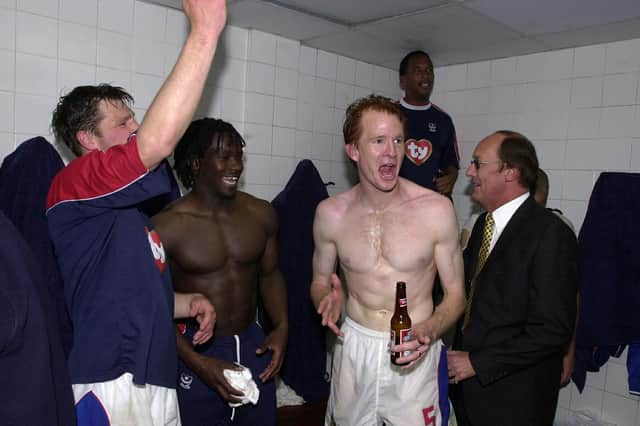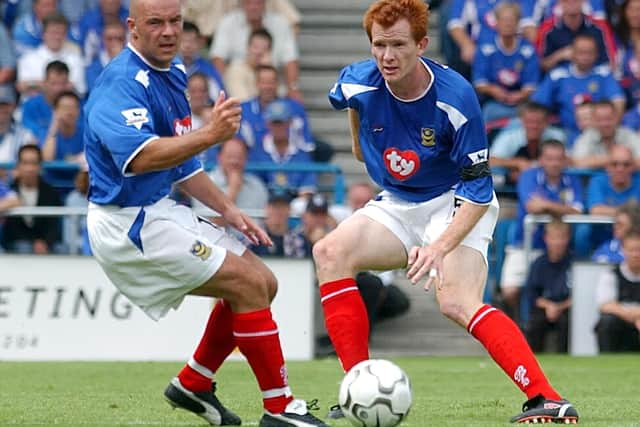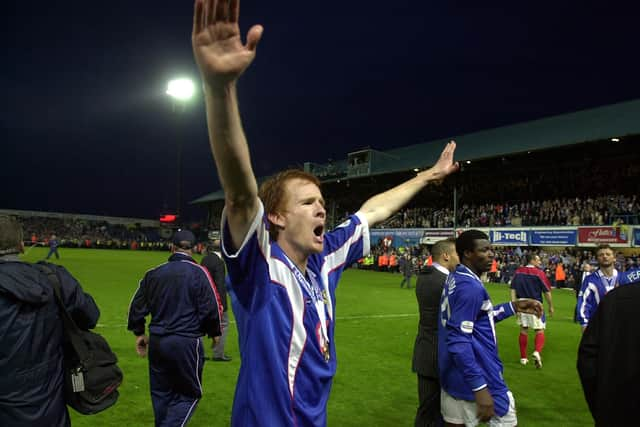Ex-West Ham and Leeds defender Hayden Foxe: I took Portsmouth to the Premier League - then missed two-and-a-half years


Yet the centre-half would also become one of the early casualties, injury prematurely curtailing his top-flight involvement during a two-and-a-half year battle.
A 3-0 defeat at Southampton in December 2003 signalled the start of foot problems which subsequently blighted the Australian international’s career.
Indeed, he would never play for Pompey again.
Advertisement
Hide AdAdvertisement
Hide AdA sad demise for a mainstay of that swashbuckling side which gloriously claimed the Division One title under Harry Redknapp in 2002-03.
Foxe had been tempted out of the Premier League to become the Blues’ first signing during that summer’s pivotal recruitment drive.
A £400,000 transfer from West Ham, his May 2002 arrival preceded Shaka Hislop, Arjan De Zeeuw, Paul Merson, Matt Taylor, Richard Hughes, Vincent Pericard and Steve Stone.
However, he would feature just 10 times in the top-flight for Pompey.
Advertisement
Hide AdAdvertisement
Hide Ad

Foxe told The News: ‘The promotion season was pretty much my last injury-free campaign. They are the cards which life deals you, you must cope with that.
‘The stress fractures to my feet started during the first half of our first Premier League season – and they never recovered during the rest of my playing career.
‘I was injured for the next two-and-a-half years, I didn’t play one game. It was tough to take and common sense for the club to release me.
‘This wasn’t a case of receiving a kick, it heals and then you move on. This was an overuse injury on my feet and was incredibly difficult to find a solution to the problem.
Advertisement
Hide AdAdvertisement
Hide Ad

‘Basically, I had a weak part of the bone in my feet and couldn’t handle the loadings of a footballer.
‘The problem was very rare at the time, there was definitely a lack of awareness about it. It was a navicular bone, which had a small blood supply, so the healing process was very long.
‘What happens is you can’t take the overloading anymore. You can’t push off, you can’t jump, you can’t walk.
‘Over time, if you don’t load it, it will heal. However, mine had got to the point where it had been overloaded so much that the only way it would heal was to use the bone marrow of a cow, which comes from the States. That is then put into where your stress fracture is and screwed together to bind it.
Advertisement
Hide AdAdvertisement
Hide Ad‘It would work for a certain period – then the overload situation came in.
‘Whenever it flared up, my routine was to have rest, go into a boot, have an operation, put a pin in it and then start a rehab programme. I’d be running fine for two or three months – and it would happen again. The stress fractures had reappeared and I was back to square one.
‘It was more my left foot, then what happened was I’d start compensating and taking more loading on my right. Then my right foot would be overloaded and the stress fractures would appear there as well.
‘I was under the impression that the harder you train, the more reward you get. In my case, I later discovered it was actually doing more damage.
Advertisement
Hide AdAdvertisement
Hide Ad‘This was more about how you must limit and restrict your training program so your bones don't stress and load as much.
‘We really couldn't figure out until many years down the track how I should train and go about my loadings for the week. It was a difficult time.
‘In total, I had three operations, two on my left foot and one on my right – but that wasn’t even the issue.’
Redknapp had initially recruited Foxe from Japan side Sanfrecce Hiroshima for West Ham in March 2001.
Advertisement
Hide AdAdvertisement
Hide AdHaving represented Australia in the 1996 and 2000 Olympics, Foxe went on to feature 12 times for the Hammers, starting seven Premier League matches, before following his former boss to the south coast.
The centre-half made 33 appearances during the 2002-03 campaign as the Blues claimed the Division One title to reach the Premier League.
Then, four months into Pompey’s top-flight return, he first experienced his foot problems.
In May 2005, Foxe was released by boss Alain Perrin, along with Shaka Hislop, Patrik Berger and Steve Stone. Yet unlike the others, there was no controversy over his exit.
Advertisement
Hide AdAdvertisement
Hide AdAfter two-and-a-half years on the sidelines, he left Pompey following 46 games and two goals – and at the age of 27.
Following time rehabilitating in Australia, Foxe returned to England to represent Kevin Blackwell’s Leeds for the 2006-07 season, handed 21 outings and scoring once.
However, a campaign which resulted in relegation to League One would represent his final season on these shores.
He added: ‘I came back to Australia for another operation and that is when I met up with a well-known sports scientist at the Australian Institute of Sport, who showed me how to train.
Advertisement
Hide AdAdvertisement
Hide Ad‘What I learnt late in my career was I actually had to reduce my training, so ended up training every other day. However, I wasn’t a world-class player who could get away with barely training and then playing at weekends.
‘At Leeds, I trained once or twice a week, but the game was getting quicker and faster. Training for that length, and then trying to play in the Championship, meant I wasn’t fit enough to be able to play at that level.
‘I am not saying I was rubbish or world class as a player, but, with my abilities, in order to play professional football at Championship or Premier League level, I needed to train every day. I couldn’t.
‘All players are different, some may be able to get away with it, but the majority need to train every day.
Advertisement
Hide AdAdvertisement
Hide Ad‘Still, I now had a training programme which meant I continued playing football, but limiting the amount of time I had on the grass.
‘That enabled me to come back and play in Australia, training once or twice a week, and I played for another four years after that.
‘It remains a very, very rare injury, there are not many players I know of who have had it, but these days it would be handled more knowledgeably.
‘You would be able to load it in a different way, enabling you to still maintain your fitness. With all the different machinery and devices now, whichever days you need to train, you could do that.’
Advertisement
Hide AdAdvertisement
Hide AdFoxe would see out his playing days in his native Australia, turning out for Perth Glory and then Sydney, before retiring in February 2011 at the age of 33.
He has since turned to coaching, assisting former Crystal Palace defender Tony Popovic at Western Sydney Wanderers, with the duo then taking over at Perth Glory in June 2018.
He said: ‘What happened to me is football. Lots of people have had other major, major disastrous events than a fella with stress fractures in his feet.
‘In the end, we kind of found a solution to it. Although not the one I wanted to hear, at least it got me to play for another four or five years back in Australia.
Advertisement
Hide AdAdvertisement
Hide Ad‘I had a great year-and-a-half of playing football at Pompey – and then not. But met many good people, so I was very fortunate in a lot of ways.
‘I have good memories of Pompey, they will last with me forever. That is not something you can take away.’
A message from the Editor
Thank you for reading this story on portsmouth.co.uk. While I have your attention, I also have an important request to make of you.
With the coronavirus lockdown having a major impact on many of our advertisers - and consequently the revenue we receive - we are more reliant than ever on you taking out a digital subscription.
Advertisement
Hide AdAdvertisement
Hide AdSubscribe to portsmouth.co.uk and enjoy unlimited access to local news and information online and on our app. With a digital subscription, you can read more than 5 articles, see fewer ads, enjoy faster load times, and get access to exclusive newsletters and content. Visit our Subscription page now to sign up.
Our journalism costs money and we rely on advertising, print and digital revenues to help to support them. By supporting us, we are able to support you in providing trusted, fact-checked content for this website.
Comment Guidelines
National World encourages reader discussion on our stories. User feedback, insights and back-and-forth exchanges add a rich layer of context to reporting. Please review our Community Guidelines before commenting.
